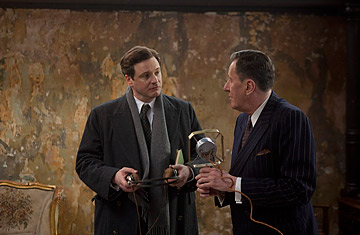
Colin Firth, left, and Geoffrey Rush star in Tom Hooper's film The King's Speech
(2 of 2)
Oscar's Favorite Rating: R
An R-rated film may carry a stigma at the box office, but at the Academy Awards, it's golden. Since the current ratings system was instituted in 1968, about half of all Oscar winners for Best Picture have been rated R. Indeed, The King's Speech was the sixth consecutive R-rated Best Picture — after Crash, The Departed, No Country for Old Men, Slumdog Millionaire and The Hurt Locker. In the system's earliest days, the movies didn't change — the ratings did. Midnight Cowboy (1969), the only X-rated film to win the Best Picture Oscar (1971's A Clockwork Orange is the only other X-rated film to have been nominated), was later rerated as an R without a frame of film being excised. Terms of Endearment's R was eventually flipped to a PG. Another winner, Amadeus, was PG in its initial release, R in the director's cut. And though standards have evolved (we might say slackened) over the decades, some ratings of yore were more lenient than today's. The 1980 Best Picture, Kramer vs. Kramer, contained a brief scene of a nude JoBeth Williams but was still rated PG.
The other Best Picture winners with R ratings are The French Connection, The Godfather, The Godfather Part II, One Flew over the Cuckoo's Nest, The Deer Hunter, Ordinary People, Platoon, Rain Man, The Silence of the Lambs, Unforgiven, Schindler's List, Braveheart, The English Patient, Shakespeare in Love and Gladiator. Note the high proportion of smash hits among these "restricted" titles. The adult audience for whom the films were made was still sizable enough to earn them gigantic profits.
There is a difference between most of these films and The King's Speech: the R-rated elements in them — language, violence, sexuality — were pervasive, sewn into the fabric of their stories. The Godfather or Platoon or Braveheart or The Hurt Locker couldn't be cut to PG-13 requirements without being eviscerated. The King's Speech, though, was rated R for one dramatic, comic outburst of profanity. Now, with that scene modified, it's a wonder the film wasn't given a gentler, more appropriate PG rating. The upshot was that a movie originally "rated R for some language" is now "rated PG-13 for language" — apparently "some" is the new four-letter word. Parents can take their kids to the film in the assurance that even the most impressionable little ones will emerge from it shouting nothing more toxic than "Fartity poop William bosom!"
Weinstein's decision to change the film is, if not defensible, certainly plausible. In a medium where so much money's at stake, people constantly make compromises: the writer with the director, the director with the producer, the producer with the studio, the studio with the MPAA and so on. Normally these deals are concessions are made in private, before the film is released. When he ran Miramax Films, Weinstein frequently cut the foreign films he acquired (Cinema Paradiso, Farewell My Concubine) to suit what he thought would be the American audience's taste. His mistake with The King's Speech was to compromise after his film had won both a slew of Oscars and the hearts of moviegoers and many critics.
Apparently, the public doesn't like to have its revered films tampered with either: on its first weekend, the new version earned just $1.2 million, down about 30% from the $1.6 million the R-rated version took in the previous week (though the gross might have fallen anyway, because practically everyone who wanted to see it has done so). But the audience has spoken: If they're going to see The King's Speech, dash it all, they want to hear the King's speech too. Every f___in' word of it.
